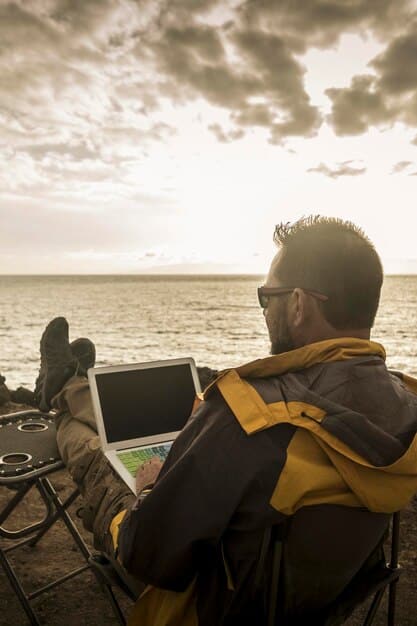Digital Nomad US: Find Affordable Long-Term Accommodation in 2025

Digital nomad living in the US in 2025 requires strategic planning to secure affordable long-term accommodation, balancing cost-effectiveness with comfort and location through methods like extended stays, house sitting, and leveraging online resources.
Dreaming of the digital nomad life in the US but worried about the cost of accommodation? You’re not alone. Finding affordable long-term housing is a key challenge, but it’s entirely possible with the right strategies. This guide, tailored for 2025, will show you how to make your digital nomad living: How to find affordable long-term accommodation in the US in 2025 a reality.
Understanding the US Accommodation Landscape for Digital Nomads
Before diving into specific strategies, it’s crucial to understand the general accommodation landscape in the US. Prices vary wildly depending on location, time of year, and the type of accommodation you’re seeking. Knowing this will help you narrow your search and set realistic expectations for your budget.
Regional Price Variations
The cost of living, including accommodation, differs significantly across different states and cities. Coastal cities like New York and San Francisco are notoriously expensive, while smaller towns in the Midwest or South often offer more affordable options. Researching average rental prices in different areas is a vital first step.
Seasonal Fluctuations
Tourist seasons can drive up accommodation costs in popular destinations. Consider traveling during the shoulder seasons (spring or fall) when prices tend to be lower and crowds are thinner. Flexibility in your travel dates can translate to significant savings.
- Research local rental rates: Use websites like Zillow, Realtor.com, and Apartments.com to get an overview of rental costs in your target locations.
- Consider alternative locations: Explore smaller cities or towns near major hubs, which often offer lower prices without sacrificing access to amenities.
- Be flexible with your travel dates: Avoid peak tourist seasons to secure better deals on accommodation.

By understanding these key factors, you’ll be better equipped to navigate the US accommodation market and find options that align with your budget and lifestyle.
Leveraging Extended Stay Options: Hotels and Serviced Apartments
Extended stay hotels and serviced apartments are designed for travelers who need a place to stay for a week or longer. These options often offer more affordable rates than traditional hotels, along with amenities that cater to long-term guests. Factors like location, amenities, and flexibility should influence your choice.
Benefits of Extended Stay Hotels
Extended stay hotels typically include amenities like kitchenettes, laundry facilities, and free breakfast, making them a convenient and cost-effective choice. Negotiating rates for longer stays is also often possible.
Serviced Apartments: A Home Away From Home
Serviced apartments offer fully furnished apartments with hotel-like services such as housekeeping and maintenance. They provide a more home-like environment, which can be beneficial for long-term stays. They often include separate living areas, fully equipped kitchens, and other amenities that provide a more comfortable living experience.
- Research popular extended stay chains: Brands like Extended Stay America, Homewood Suites, and Residence Inn offer consistent quality and amenities across various locations.
- Compare amenities and services: Consider what’s included in the rate, such as breakfast, Wi-Fi, and laundry facilities.
- Negotiate rates for longer stays: Contact the hotel or apartment directly to inquire about discounts for stays of a month or more.
Extended stay options provide a balance of convenience and affordability, making them a solid choice for digital nomads seeking long-term accommodation in the US.
Home Sharing and Short-Term Rentals: Airbnb and Beyond
Home sharing platforms like Airbnb have revolutionized the travel industry, offering a wide range of accommodation options from private rooms to entire homes. Explore strategies for using these platforms effectively to get the best deals and ensure a comfortable stay. However, it’s not the only player, and you should consider other options.
Optimizing Your Airbnb Search
Using filters to specify your needs, such as amenities, price range, and location, can help you narrow down your search. Reading reviews from previous guests is also crucial for ensuring a positive experience.
Beyond Airbnb: Exploring Alternative Platforms
Besides Airbnb, consider platforms like VRBO, Booking.com, and local rental websites. These platforms may offer different listings and pricing, giving you more options to choose from. Also, checking local rental companies can provide more options than major platforms.

- Use filters to narrow your search: Specify your desired amenities, price range, and location to find listings that meet your needs.
- Read reviews carefully: Pay attention to comments about cleanliness, accuracy of the listing description, and host responsiveness.
- Contact hosts directly to negotiate: Inquire about discounts for longer stays or off-season bookings.
By mastering the art of home sharing and short-term rentals, you can find unique and affordable accommodation options while experiencing local culture and communities.
House Sitting and Pet Sitting: Affordable Accommodation in Exchange for Care
House sitting and pet sitting offer a unique opportunity to live rent-free in exchange for taking care of someone’s home and/or pets. This option can be especially appealing for animal lovers and those seeking a more immersive travel experience.
Finding House Sitting Opportunities
Websites like TrustedHouseSitters, MindMyHouse, and Nomador connect homeowners with responsible house sitters. Creating a detailed profile and applying for relevant opportunities are key to success. You can also look for local house sitting groups to find people in need of sitters and build up your reputation.
The Responsibilities of a House Sitter
Typical responsibilities include watering plants, collecting mail, and ensuring the security of the property. If pet sitting is involved, you’ll also need to feed, walk, and care for the animals. Setting clear expectations with the homeowner beforehand is essential. Good communication and leaving their property in pristine condition is paramount to being rehired.
- Create a compelling profile: Highlight your experience, skills, and references to stand out from other applicants.
- Apply for opportunities that match your skills and interests: Focus on listings where you have relevant experience, such as caring for specific types of pets.
- Communicate clearly with homeowners: Discuss expectations, responsibilities, and emergency procedures before accepting a house sitting assignment.
House sitting and pet sitting provide an excellent way to save money on accommodation while enjoying unique travel experiences and forming connections with local communities.
Co-living Spaces: Community and Convenience for Digital Nomads
Co-living spaces are designed to foster community and convenience for digital nomads and remote workers. These spaces offer shared accommodation along with amenities like co-working areas, social events, and communal kitchens.
Benefits of Co-living
Co-living spaces provide a sense of community, which can be especially valuable for those who travel alone. They also offer a hassle-free living experience with utilities, cleaning, and maintenance often included in the rent. Some offer exclusive access to events and experiences and also allow you to form a strong bond with those living in the community.
Finding Co-living Spaces in the US
Websites like Roam, Outsite, and Common list co-living spaces in various cities across the US. Researching different options and reading reviews can help you find a space that aligns with your needs and preferences.
- Research co-living networks: Explore options like Roam, Outsite, and Common to find spaces in your desired locations.
- Consider the included amenities: Look for spaces that offer amenities that are important to you, such as co-working areas, high-speed internet, and social events.
- Read reviews from current and former residents: Get insights into the community atmosphere, management responsiveness, and overall living experience.
Co-living spaces offer a unique blend of affordability, community, and convenience, making them an appealing option for digital nomads seeking long-term accommodation in the US.
Budgeting and Negotiating: Securing the Best Deals
Effective budgeting and negotiation are key to securing affordable long-term accommodation as a digital nomad. Planning your finances and knowing how to negotiate can help you stretch your budget further.
Creating a Realistic Budget
Start by calculating your income and expenses, including accommodation, food, transportation, and entertainment. Allocate a specific amount for accommodation and stick to it as closely as possible. You can often find ways to make your budget go further, or increase it by picking up skills to earn money online.
Negotiation Strategies
Don’t be afraid to negotiate rates with hotels, landlords, or Airbnb hosts. Offering to pay in cash, booking during the off-season, or committing to a longer stay can give you more leverage. The worst they can say is no; however, knowing how to haggle can save money in other areas as well.
- Calculate your income and expenses: Create a detailed budget to track your spending and identify areas where you can save money.
- Set a realistic accommodation budget: Allocate a specific amount for accommodation and stick to it as closely as possible.
- Negotiate rates with hosts and landlords: Offer to pay in cash, book during the off-season, or commit to a longer stay to get a better deal.
By mastering the art of budgeting and negotiation, you can secure affordable long-term accommodation and make the most of your digital nomad adventure in the US.
| Key Point | Brief Description |
|---|---|
| 💰 Budgeting | Plan finances to ensure affordable accommodation. |
| 🏡 House Sitting | Live rent-free by caring for homes or pets. |
| 🤝 Co-living | Join communities offering shared accommodation. |
| 🧳 Extended Stays | Opt for hotels and apartments with long-term rates. |
Frequently Asked Questions
▼
States like Oklahoma, Kansas, and Alabama tend to have lower living costs. However, research specific cities within these states to find the best deals.
▼
Use reputable platforms, carefully review homeowner profiles, and ensure clear communication about responsibilities and expectations before committing.
▼
Often, yes. They usually include utilities and amenities, which can make them more cost-effective than renting an apartment alone.
▼
Prioritize kitchenettes, laundry facilities, free Wi-Fi, and breakfast. Negotiate for discounts on longer stays, especially if you plan to stay over a month.
▼
Contact hosts directly, book during the off-season, and offer to stay for longer periods to secure discounts. Being polite and clear is always important.
Conclusion
Navigating the US as a digital nomad in 2025 means embracing creative accommodation solutions. By leveraging extended stays, mastering home-sharing platforms, exploring house-sitting, considering co-living, and honing your budgeting skills, you can find affordable long-term housing and make your nomadic dreams a reality.





